英语泛读教程 4-Unit 2 Exploration
大学英语泛读教程第四册全文翻译
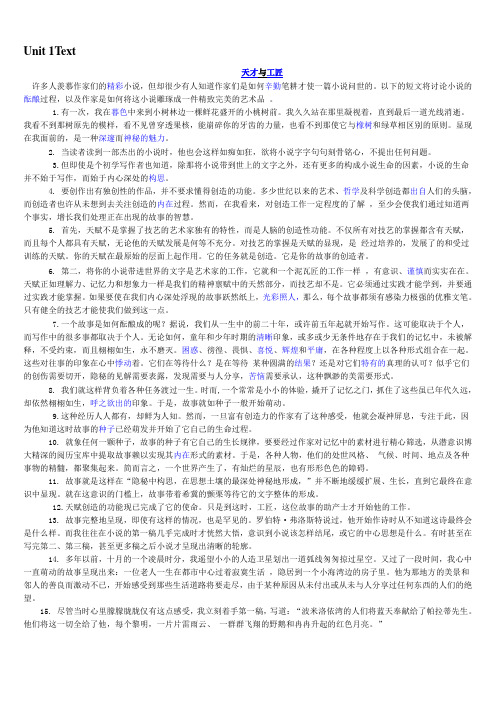
Unit 1Text天才与工匠许多人羡慕作家们的精彩小说,但却很少有人知道作家们是如何辛勤笔耕才使一篇小说问世的。
以下的短文将讨论小说的酝酿过程,以及作家是如何将这小说雕琢成一件精致完美的艺术品。
1.有一次,我在暮色中来到小树林边一棵鲜花盛开的小桃树前。
我久久站在那里凝视着,直到最后一道光线消逝。
我看不到那树原先的模样,看不见曾穿透果核,能崩碎你的牙齿的力量,也看不到那使它与橡树和绿草相区别的原则。
显现在我面前的,是一种深邃而神秘的魅力。
2. 当读者读到一部杰出的小说时,他也会这样如痴如狂,欲将小说字字句句刻骨铭心,不提出任何问题。
3.但即使是个初学写作者也知道,除那将小说带到世上的文字之外,还有更多的构成小说生命的因素,小说的生命并不始于写作,而始于内心深处的构思。
4. 要创作出有独创性的作品,并不要求懂得创造的功能。
多少世纪以来的艺术、哲学及科学创造都出自人们的头脑,而创造者也许从未想到去关注创造的内在过程。
然而,在我看来,对创造工作一定程度的了解,至少会使我们通过知道两个事实,增长我们处理正在出现的故事的智慧。
5. 首先,天赋不是掌握了技艺的艺术家独有的特性,而是人脑的创造性功能。
不仅所有对技艺的掌握都含有天赋,而且每个人都具有天赋,无论他的天赋发展是何等不充分。
对技艺的掌握是天赋的显现,是经过培养的,发展了的和受过训练的天赋。
你的天赋在最原始的层面上起作用。
它的任务就是创造。
它是你的故事的创造者。
6. 第二,将你的小说带进世界的文字是艺术家的工作,它就和一个泥瓦匠的工作一样,有意识、谨慎而实实在在。
天赋正如理解力、记忆力和想象力一样是我们的精神禀赋中的天然部分,而技艺却不是。
它必须通过实践才能学到,并要通过实践才能掌握。
如果要使在我们内心深处浮现的故事跃然纸上,光彩照人,那么,每个故事都须有感染力极强的优雅文笔。
只有健全的技艺才能使我们做到这一点。
7.一个故事是如何酝酿成的呢?据说,我们从一生中的前二十年,或许前五年起就开始写作。
现代大学英语精读4第三版unit2读后感
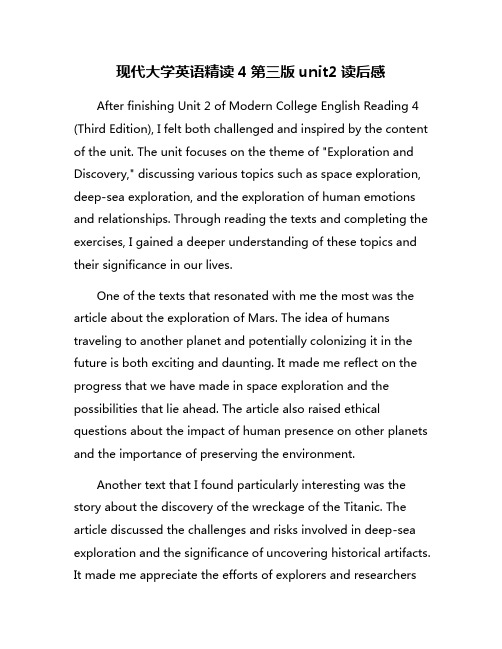
现代大学英语精读4第三版unit2读后感After finishing Unit 2 of Modern College English Reading 4 (Third Edition), I felt both challenged and inspired by the content of the unit. The unit focuses on the theme of "Exploration and Discovery," discussing various topics such as space exploration, deep-sea exploration, and the exploration of human emotions and relationships. Through reading the texts and completing the exercises, I gained a deeper understanding of these topics and their significance in our lives.One of the texts that resonated with me the most was the article about the exploration of Mars. The idea of humans traveling to another planet and potentially colonizing it in the future is both exciting and daunting. It made me reflect on the progress that we have made in space exploration and the possibilities that lie ahead. The article also raised ethical questions about the impact of human presence on other planets and the importance of preserving the environment.Another text that I found particularly interesting was the story about the discovery of the wreckage of the Titanic. The article discussed the challenges and risks involved in deep-sea exploration and the significance of uncovering historical artifacts. It made me appreciate the efforts of explorers and researcherswho work tirelessly to unravel the mysteries of the past and preserve our cultural heritage.In addition to these texts, I also enjoyed the reading comprehension exercises and vocabulary activities in this unit. They helped me improve my reading comprehension skills and expand my vocabulary. The exercises were challenging at times, but they were also rewarding as they deepened my understanding of the texts and helped me analyze them more critically.Overall, Unit 2 of Modern College English Reading 4 (Third Edition) was a thought-provoking and enlightening experience for me. It broadened my horizons, stimulated my curiosity, and enriched my knowledge of various exploration and discovery topics. I look forward to continuing my English studies and exploring more fascinating themes in the future units of this textbook.。
4《泛读教程》黄灏doc
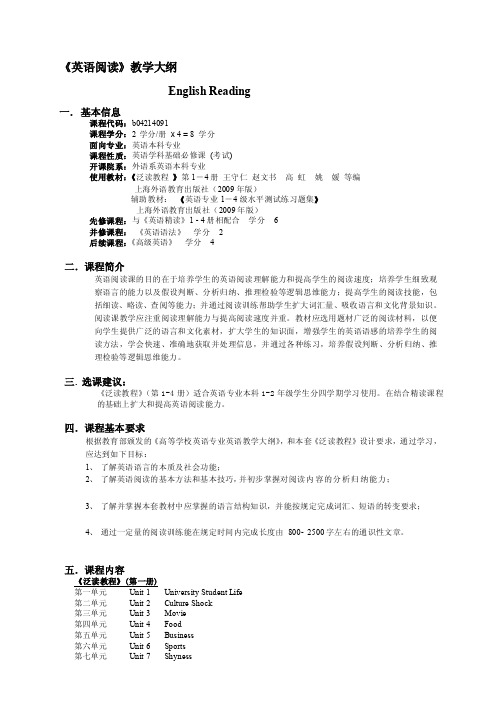
《英语阅读》教学大纲English Reading一.基本信息课程代码:b04214091课程学分:2 学分/册x 4 = 8 学分面向专业:英语本科专业课程性质:英语学科基础必修课(考试)开课院系:外语系英语本科专业使用教材:《泛读教程》第1-4册王守仁赵文书高虹姚媛等编上海外语教育出版社(2009年版)辅助教材:《英语专业1-4级水平测试练习题集》上海外语教育出版社(2009年版)先修课程:与《英语精读》1 - 4册相配合学分6并修课程:《英语语法》学分2后续课程:《高级英语》学分4二.课程简介英语阅读课的目的在于培养学生的英语阅读理解能力和提高学生的阅读速度;培养学生细致观察语言的能力以及假设判断、分析归纳、推理检验等逻辑思维能力;提高学生的阅读技能,包括细读、略读、查阅等能力;并通过阅读训练帮助学生扩大词汇量、吸收语言和文化背景知识。
阅读课教学应注重阅读理解能力与提高阅读速度并重。
教材应选用题材广泛的阅读材料,以便向学生提供广泛的语言和文化素材,扩大学生的知识面,增强学生的英语语感的培养学生的阅读方法,学会快速、准确地获取并处理信息,并通过各种练习,培养假设判断、分析归纳、推理检验等逻辑思维能力。
三. 选课建议:《泛读教程》(第1-4册)适合英语专业本科1-2年级学生分四学期学习使用。
在结合精读课程的基础上扩大和提高英语阅读能力。
四.课程基本要求根据教育部颁发的《高等学校英语专业英语教学大纲》,和本套《泛读教程》设计要求,通过学习,应达到如下目标:1、了解英语语言的本质及社会功能;2、了解英语阅读的基本方法和基本技巧,并初步掌握对阅读内容的分析归纳能力;3、了解并掌握本套教材中应掌握的语言结构知识,并能按规定完成词汇、短语的转变要求;4、通过一定量的阅读训练能在规定时间内完成长度由800- 2500字左右的通识性文章。
五.课程内容《泛读教程》(第一册)第一单元Unit 1 University Student Life第二单元Unit 2 Culture Shock第三单元Unit 3 Movie第四单元Unit 4 Food第五单元Unit 5 Business第六单元Unit 6 Sports第七单元Unit 7 Shyness第八单元Unit 8 Native People第九单元Unit 9 Bible Stories第十单元Unit 10 Festivals and Holidays第十一单元Unit 11 Advertising第十二单元Unit 12 Agriculture《泛读教程》(第二册)第一单元Unit 1 Reading第二单元Unit 2 Music第三单元Unit 3 Generation第四单元Unit 4 Weather and Climate第五单元Unit 5 Work第六单元Unit 6 The African A merican第七单元Unit 7 Greek Stories第八单元Unit 8 Attitude Towards Life第九单元Unit 9 First Aid第十单元Unit 10 Marriage第十一单元Unit 11 Creativity第十二单元Unit 12 Travel《泛读教程》(第三册)第一单元 Unit 1 Reading Strategies第二单元 Unit 2 Education第三单元 Unit 3 Body language第四单元 Unit 4 Animals第五单元 Unit 5 History第六单元 Unit 6 Language第七单元 Unit 7 Space第八单元 Unit 8 Women第九单元 Unit 9 Cities第十单元 Unit 10 Cross-cultural Communication 第十一单元 Unit 11 Information Retrieval第十二单元 Unit 12 Environment《泛读教程》(第四册)第一单元Unit 1 Language Testing第二单元Unit 2 Exploration第三单元Unit 3 Refugee第四单元Unit 4 Cigarettes第五单元Unit 5 Globalization第六单元Unit 6 Immigrants第七单元Unit 7 Ecology第八单元Unit 8 Holocaust第九单元Unit 9 Diplomatic Practice第十单元Unit 10 Christianity第十一单元Unit 11 Politics第十二单元Unit 12 Art六.课内实验名称及基本要求(略)七.教学进度(第1 - 4册基本进度如下 , 可作适当调整)第一单元 2 课时/周第二单元 2 课时/周第三单元 2 课时/周第四单元 2 课时/周第五单元 2 课时/周第六单元 2 课时/周第七单元 2 课时/周第八单元 2 课时/周第九单元 2 课时/周第十单元 2 课时/周第十一单元 2 课时/周第十二单元 2 课时/周八.作业按照教材每章节作业分为两个部分;1.课前预习课堂必须要求全部完成的部分。
大学英语泛读教程第四册全文翻译
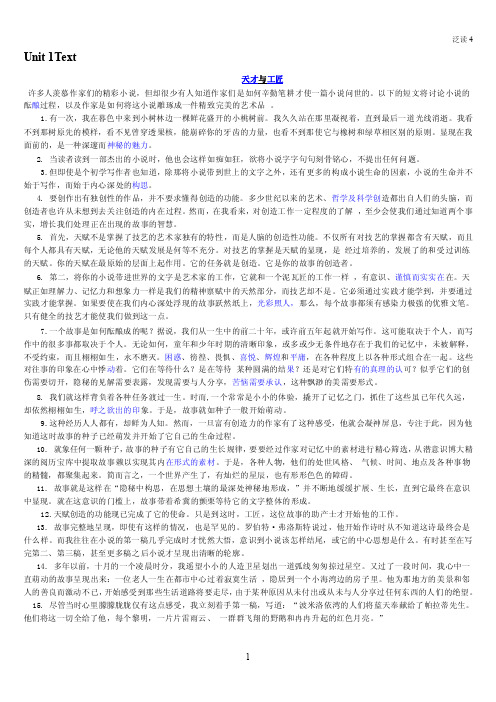
Unit 1Text天才与工匠许多人羡慕作家们的精彩小说,但却很少有人知道作家们是如何辛勤笔耕才使一篇小说问世的。
以下的短文将讨论小说的酝酿过程,以及作家是如何将这小说雕琢成一件精致完美的艺术品。
1.有一次,我在暮色中来到小树林边一棵鲜花盛开的小桃树前。
我久久站在那里凝视着,直到最后一道光线消逝。
我看不到那树原先的模样,看不见曾穿透果核,能崩碎你的牙齿的力量,也看不到那使它与橡树和绿草相区别的原则。
显现在我面前的,是一种深邃而神秘的魅力。
2. 当读者读到一部杰出的小说时,他也会这样如痴如狂,欲将小说字字句句刻骨铭心,不提出任何问题。
3.但即使是个初学写作者也知道,除那将小说带到世上的文字之外,还有更多的构成小说生命的因素,小说的生命并不始于写作,而始于内心深处的构思。
4. 要创作出有独创性的作品,并不要求懂得创造的功能。
多少世纪以来的艺术、哲学及科学创造都出自人们的头脑,而创造者也许从未想到去关注创造的内在过程。
然而,在我看来,对创造工作一定程度的了解,至少会使我们通过知道两个事实,增长我们处理正在出现的故事的智慧。
5. 首先,天赋不是掌握了技艺的艺术家独有的特性,而是人脑的创造性功能。
不仅所有对技艺的掌握都含有天赋,而且每个人都具有天赋,无论他的天赋发展是何等不充分。
对技艺的掌握是天赋的显现,是经过培养的,发展了的和受过训练的天赋。
你的天赋在最原始的层面上起作用。
它的任务就是创造。
它是你的故事的创造者。
6. 第二,将你的小说带进世界的文字是艺术家的工作,它就和一个泥瓦匠的工作一样,有意识、谨慎而实实在在。
天赋正如理解力、记忆力和想象力一样是我们的精神禀赋中的天然部分,而技艺却不是。
它必须通过实践才能学到,并要通过实践才能掌握。
如果要使在我们内心深处浮现的故事跃然纸上,光彩照人,那么,每个故事都须有感染力极强的优雅文笔。
泛读英语第四册unit2课文及翻译
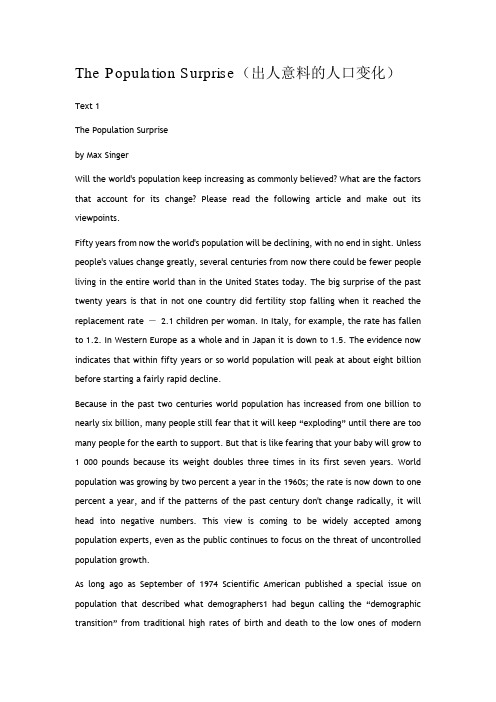
The Population Surprise(出人意料的人口变化)Text 1The Population Surpriseby Max SingerWill the world's population keep increasing as commonly believed? What are the factors that account for its change? Please read the following article and make out its viewpoints.Fifty years from now the world's population will be declining, with no end in sight. Unless people's values change greatly, several centuries from now there could be fewer people living in the entire world than in the United States today. The big surprise of the past twenty years is that in not one country did fertility stop falling when it reached the replacement rate -2.1 children per woman. In Italy, for example, the rate has fallen to 1.2. In Western Europe as a whole and in Japan it is down to 1.5. The evidence now indicates that within fifty years or so world population will peak at about eight billion before starting a fairly rapid decline.Because in the past two centuries world population has increased from one billion to nearly six billion, many people still fear that it will keep “exploding” until there are too many people for the earth to support. But that is like fearing that your baby will grow to 1 000 pounds because its weight doubles three times in its first seven years. World population was growing by two percent a year in the 1960s; the rate is now down to one percent a year, and if the patterns of the past century don't change radically, it will head into negative numbers. This view is coming to be widely accepted among population experts, even as the public continues to focus on the threat of uncontrolled population growth.As long ago as September of 1974 Scientific American published a special issue on population that described what demographers1 had begun calling the “demographic transition” from traditional high rates of birth and death to the low ones of modernsociety. The experts believed that birth and death rates would be more or less equal in the future, as they had been in the past, keeping total population stable after a level of 10-12 billion people was reached during the transition.Developments over the past twenty years show that the experts were right in thinking that population won't keep going up forever. They were wrong in thinking that after it stops going up, it will stay level. The experts' assumption that population would stabilize because birth rates would stop falling once they matched the new low death rates has not been borne out by experience. Evidence from more than fifty countries demonstrates what should be unsurprising: in a modern society the death rate doesn't determine the birth rate. If in the long run birth rates worldwide do not conveniently match death rates, then population must either rise or fall, depending on whether birth or death rates are higher. Which can we expect?The rapid increase in population during the past two centuries has been the result of lower death rates, which have produced an increase in worldwide life expectancy2 from about thirty to about sixty-two. (Since the maximum -if we do not change fundamental human physiology -is about eighty-five, the world has already gone three fifths as far as it can in increasing life expectancy.) For a while the result was a young population with more mothers in each generation, and fewer deaths than births. But even during this population explosion the average number of children born to each woman -the fertility rate -has been falling in modernizing societies. The prediction that world population will soon begin to decline is based on almost universal human behavior. In the United States fertility has been falling for 200 years (except for the blip of the Baby Boom3), but partly because of immigration it has stayed only slightly below replacement level for twenty-five years.Obviously, if for many generations the birth rate averages fewer than 2.1 children per woman, population must eventually stop growing. Recently the United Nations Population Division estimated that 44 percent of the world's people live in countries where the fertility rate has already fallen below the replacement rate, and fertility is falling fast almost everywhere else. In Sweden and Italy fertility has been belowreplacement level for so long that the population has become old enough to have more deaths than births. Declines in fertility will eventually increase the average age in the world, and will cause a decline in world population forty to fifty years from now. Because in a modern society the death rate and the fertility rate are largely independent of each other, world population need not be stable. World population can be stable only if fertility rates around the world average out to 2.1 children per woman. But why should they average 2.1, rather than 2.4, or 1.8, or some other number? If there is nothing to keep each country exactly at 2.1, then there is nothing to ensure that the overall average will be exactly 2.1.The point is that the number of children born depends on families' choices about how many children they want to raise. And when a family is deciding whether to have another child, it is usually thinking about things other than the national or the world population. Who would know or care if world population were to drop from, say, 5.85 billion to 5.81 billion? Population change is too slow and remote for people to feel in their lives -even if the total population were to double or halve in only a century. Whether world population is increasing or decreasing doesn't necessarily affect the decisions that determine whether it will increase or decrease in the future. As the systems people would say, there is no feedback loop.What does affect fertility is modernity. In almost every country where people have moved from traditional ways of life to modern ones, they are choosing to have too few children to replace themselves. This is true in Western and in Eastern countries, in Catholic and in secular societies. And it is true in the richest parts of the richest countries. The only exceptions seem to be some small religious communities. We can't be sure what will happen in Muslim countries4, because few of them have become modern yet, but so far it looks as if their fertility rates will respond to modernity as others' have.Nobody can say whether world population will ever dwindle to very low numbers; that depends on what values people hold in the future. After the approaching peak, as long as people continue to prefer saving effort and money by having fewer children, populationwill continue to decline. (This does not imply that the decision to have fewer children is selfish; it may, for example, be motivated by a desire to do more for each child.) Some people may have values significantly different from those of the rest of the world, and therefore different fertility rates. If such people live in a particular country or population group, their values can produce marked changes in the size of that country or group, even as world population changes only slowly. For example, the U.S. population, because of immigration and a fertility rate that is only slightly below replacement level, is likely to grow from 4.5 percent of the world today to 10 percent of a smaller world over the next two or three centuries. Much bigger changes in share are possible for smaller groups if they can maintain their difference from the average for a long period of time. (To illustrate: Korea's population could grow from one percent of the world to 10 percent in a single lifetime if it were to increase by two percent a year while the rest of the world population declined by one percent a year.)World population won't stop declining until human values change. But human values may well change -values, not biological imperatives, are the unfathomable variable in population predictions. It is quite possible that in a century or two or three, when just about the whole world is at least as modern as Western Europe is today, people will start to value children more highly than they do now in modern societies. If they do, and fertility rates start to climb, fertility is no more likely to stop climbing at an average rate of 2.1 children per woman than it was to stop falling at 2.1 on the way down.In only the past twenty years or so world fertility has dropped by 1.5 births per woman. Such a degree of change, were it to occur again, would be enough to turn a long-term increase in world population of one percent a year into a long-term decrease of one percent a year. Presumably fertility could someday increase just as quickly as it has declined in recent decades, although such a rapid change will be less likely once the world has completed the transition to modernity. If fertility rises only to 2.8, just 33 percent over the replacement rate, world population will eventually grow by one percent a year again -doubling in seventy years and multiplying by twenty in only three centuries.The decline in fertility that began in some countries, including the United States, in the past century is taking a long time to reduce world population because when it started, fertility was very much higher than replacement level. In addition, because a preference for fewer children is associated with modern societies, in which high living standards make time valuable and children financially unproductive and expensive to care for and educate, the trend toward lower fertility couldn't spread throughout the world until economic development had spread. But once the whole world has become modern, with fertility everywhere in the neighborhood of replacement level, new social values might spread worldwide in a few decades. Fashions in families might keep changing, so that world fertility bounced above and below replacement rate. If each bounce took only a few decades or generations, world population would stay within a reasonable narrow range -although probably with a long-term trend in one direction or the other.The values that influence decisions about having children seem, however, to change slowly and to be very widespread. If the average fertility rate were to take a long time to move from well below to well above replacement rate and back again, trends in world population could go a long way before they reversed themselves. The result would be big swings in world population -perhaps down to one or two billion and then up to 20 to 40 billion.Whether population swings are short and narrow or long and wide, the average level of world population after several cycles will probably have either an upward or a downward trend overall. Just as averaging across the globe need not result in exactly 2.1 children per woman, averaging across the centuries need not result in zero growth rather than a slowly increasing or slowly decreasing world population. But the long-term trend is less important than the effects of the peaks and troughs5 . The troughs could be so low that human beings become fewer than they were in ancient times. The peaks might cause harm from some kinds of shortages.One implication is that not even very large losses from disease or war can affect the world population in the long run nearly as much as changes in human values do. What we have learned from the dramatic changes of the past few centuries is that regardless ofthe size of the world population at any time, people's personal decisions about how many children they want can make the world population go anywhere -to zero or to 100 billion or more.(1916words)课文一出人意料的人口变化马克斯·辛格世界人口会象人们通常认为的那样持续增长吗?造成人口变化的因素是什么?请阅读下面的文章,并弄清其观点。
泛读英语第四册unit2课文及翻译

The Population Surprise(出人意料的人口变化)Text 1The Population Surpriseby Max SingerWill the world's population keep increasing as commonly believed? What are the factors that account for its change? Please read the following article and make out its viewpoints.Fifty years from now the world's population will be declining, with no end in sight. Unless people's values change greatly, several centuries from now there could be fewer people living in the entire world than in the United States today. The big surprise of the past twenty years is that in not one country did fertility stop falling when it reached the replacement rate -2.1 children per woman. In Italy, for example, the rate has fallen to 1.2. In Western Europe as a whole and in Japan it is down to 1.5. The evidence now indicates that within fifty years or so world population will peak at about eight billion before starting a fairly rapid decline.Because in the past two centuries world population has increased from one billion to nearly six billion, many people still fear that it will keep “exploding” until there are too many people for the earth to support. But that is like fearing that your baby will grow to 1 000 pounds because its weight doubles three times in its first seven years. World population was growing by two percent a year in the 1960s; the rate is now down to one percent a year, and if the patterns of the past century don't change radically, it will head into negative numbers. This view is coming to be widely accepted among population experts, even as the public continues to focus on the threat of uncontrolled population growth.As long ago as September of 1974 Scientific American published a special issue on population that described what demographers1 had begun calling the “demographic transition” from traditional high rates of birth and death to the low ones of modernsociety. The experts believed that birth and death rates would be more or less equal in the future, as they had been in the past, keeping total population stable after a level of 10-12 billion people was reached during the transition.Developments over the past twenty years show that the experts were right in thinking that population won't keep going up forever. They were wrong in thinking that after it stops going up, it will stay level. The experts' assumption that population would stabilize because birth rates would stop falling once they matched the new low death rates has not been borne out by experience. Evidence from more than fifty countries demonstrates what should be unsurprising: in a modern society the death rate doesn't determine the birth rate. If in the long run birth rates worldwide do not conveniently match death rates, then population must either rise or fall, depending on whether birth or death rates are higher. Which can we expect?The rapid increase in population during the past two centuries has been the result of lower death rates, which have produced an increase in worldwide life expectancy2 from about thirty to about sixty-two. (Since the maximum -if we do not change fundamental human physiology -is about eighty-five, the world has already gone three fifths as far as it can in increasing life expectancy.) For a while the result was a young population with more mothers in each generation, and fewer deaths than births. But even during this population explosion the average number of children born to each woman -the fertility rate -has been falling in modernizing societies. The prediction that world population will soon begin to decline is based on almost universal human behavior. In the United States fertility has been falling for 200 years (except for the blip of the Baby Boom3), but partly because of immigration it has stayed only slightly below replacement level for twenty-five years.Obviously, if for many generations the birth rate averages fewer than 2.1 children per woman, population must eventually stop growing. Recently the United Nations Population Division estimated that 44 percent of the world's people live in countries where the fertility rate has already fallen below the replacement rate, and fertility is falling fast almost everywhere else. In Sweden and Italy fertility has been belowreplacement level for so long that the population has become old enough to have more deaths than births. Declines in fertility will eventually increase the average age in the world, and will cause a decline in world population forty to fifty years from now. Because in a modern society the death rate and the fertility rate are largely independent of each other, world population need not be stable. World population can be stable only if fertility rates around the world average out to 2.1 children per woman. But why should they average 2.1, rather than 2.4, or 1.8, or some other number? If there is nothing to keep each country exactly at 2.1, then there is nothing to ensure that the overall average will be exactly 2.1.The point is that the number of children born depends on families' choices about how many children they want to raise. And when a family is deciding whether to have another child, it is usually thinking about things other than the national or the world population. Who would know or care if world population were to drop from, say, 5.85 billion to 5.81 billion? Population change is too slow and remote for people to feel in their lives -even if the total population were to double or halve in only a century. Whether world population is increasing or decreasing doesn't necessarily affect the decisions that determine whether it will increase or decrease in the future. As the systems people would say, there is no feedback loop.What does affect fertility is modernity. In almost every country where people have moved from traditional ways of life to modern ones, they are choosing to have too few children to replace themselves. This is true in Western and in Eastern countries, in Catholic and in secular societies. And it is true in the richest parts of the richest countries. The only exceptions seem to be some small religious communities. We can't be sure what will happen in Muslim countries4, because few of them have become modern yet, but so far it looks as if their fertility rates will respond to modernity as others' have.Nobody can say whether world population will ever dwindle to very low numbers; that depends on what values people hold in the future. After the approaching peak, as long as people continue to prefer saving effort and money by having fewer children, populationwill continue to decline. (This does not imply that the decision to have fewer children is selfish; it may, for example, be motivated by a desire to do more for each child.) Some people may have values significantly different from those of the rest of the world, and therefore different fertility rates. If such people live in a particular country or population group, their values can produce marked changes in the size of that country or group, even as world population changes only slowly. For example, the U.S. population, because of immigration and a fertility rate that is only slightly below replacement level, is likely to grow from 4.5 percent of the world today to 10 percent of a smaller world over the next two or three centuries. Much bigger changes in share are possible for smaller groups if they can maintain their difference from the average for a long period of time. (To illustrate: Korea's population could grow from one percent of the world to 10 percent in a single lifetime if it were to increase by two percent a year while the rest of the world population declined by one percent a year.)World population won't stop declining until human values change. But human values may well change -values, not biological imperatives, are the unfathomable variable in population predictions. It is quite possible that in a century or two or three, when just about the whole world is at least as modern as Western Europe is today, people will start to value children more highly than they do now in modern societies. If they do, and fertility rates start to climb, fertility is no more likely to stop climbing at an average rate of 2.1 children per woman than it was to stop falling at 2.1 on the way down.In only the past twenty years or so world fertility has dropped by 1.5 births per woman. Such a degree of change, were it to occur again, would be enough to turn a long-term increase in world population of one percent a year into a long-term decrease of one percent a year. Presumably fertility could someday increase just as quickly as it has declined in recent decades, although such a rapid change will be less likely once the world has completed the transition to modernity. If fertility rises only to 2.8, just 33 percent over the replacement rate, world population will eventually grow by one percent a year again -doubling in seventy years and multiplying by twenty in only three centuries.The decline in fertility that began in some countries, including the United States, in the past century is taking a long time to reduce world population because when it started, fertility was very much higher than replacement level. In addition, because a preference for fewer children is associated with modern societies, in which high living standards make time valuable and children financially unproductive and expensive to care for and educate, the trend toward lower fertility couldn't spread throughout the world until economic development had spread. But once the whole world has become modern, with fertility everywhere in the neighborhood of replacement level, new social values might spread worldwide in a few decades. Fashions in families might keep changing, so that world fertility bounced above and below replacement rate. If each bounce took only a few decades or generations, world population would stay within a reasonable narrow range -although probably with a long-term trend in one direction or the other.The values that influence decisions about having children seem, however, to change slowly and to be very widespread. If the average fertility rate were to take a long time to move from well below to well above replacement rate and back again, trends in world population could go a long way before they reversed themselves. The result would be big swings in world population -perhaps down to one or two billion and then up to 20 to 40 billion.Whether population swings are short and narrow or long and wide, the average level of world population after several cycles will probably have either an upward or a downward trend overall. Just as averaging across the globe need not result in exactly 2.1 children per woman, averaging across the centuries need not result in zero growth rather than a slowly increasing or slowly decreasing world population. But the long-term trend is less important than the effects of the peaks and troughs5 . The troughs could be so low that human beings become fewer than they were in ancient times. The peaks might cause harm from some kinds of shortages.One implication is that not even very large losses from disease or war can affect the world population in the long run nearly as much as changes in human values do. What we have learned from the dramatic changes of the past few centuries is that regardless ofthe size of the world population at any time, people's personal decisions about how many children they want can make the world population go anywhere -to zero or to 100 billion or more.(1916words)课文一出人意料的人口变化马克斯·辛格世界人口会象人们通常认为的那样持续增长吗?造成人口变化的因素是什么?请阅读下面的文章,并弄清其观点。
英语泛读教程4文章翻译及答案 完整版
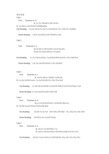
课文答案Unit 1Text: Exercises A. dB. 1.c 2.c 3.b 4.d 5.c 6.b 7.b 8.aD. 1.a 2.b 3.c 4.d 5.b 6.d 7.d 8.b9.a10.aFast Reading: 1.a 2.a 3.d 4.c 5.c 6.d 7.c 8.d 9.d 10.c 11.c 12.b 13.c 14.d15.aHome Reading: 1.d 2.c 3.a 4.d 5.c 6.d 7.b 8.b 9.c 10.aUnit 2Text: Exercises A. aB.1.b 2.b 3.c 4.b 5.d 6.b 7.a 8 .b 9.a 10.cD.1.b 2.a 3.a 4.a 5.b 6.a 7.c 8.d 9.cFast Reading: 1.a 2.c 3.d 4.a 5.b 6.c 7.a 8.d 9.d 10.b 11.d 12.c 13.c 14.d 15.bHome Reading: 1.d .2.a 3.d 4.d 5.b 6.d 7.c 8.c 9.d 10.dUnit 3Text: Exercises A. cB. 1.b 2.a 3.b 4.c 5.d 6.b 7.a 8.b 9.bD. 1.a 2.a 3.d 4.b 5.a 6.c 7.c 8.a 9.d 10.b 11.c 12.c 13.a 14.dFast Reading: 1.c 2.b 3.b 4.a 5.b 6.b 7.a 8.d 9.b 10.b 11.b 12.b 13.d 14.a 1 5.dHome Reading: 1.c 2.a 3.a 4.b 5.a 6.b 7.d 8.c 9.bUnit 4Text: Exercises A. bB.1.c 2.d 3.b 4.d 5.b 6.c 7.a 8.d 9.b 10.d 11.cD. 1.d 2.b 3.a 4.a 5.b 6.d 7.b 8.a 9.b 10.dFast Reading: 1.d 2.b 3.c 4.c 5.d 6.b 7.d 8.c 9.b 10.d 11.c 12.a 13.c 14.c 15.d Home Reading: 1.d 2.d 3.c 4.c 5.a 6.d 7.b 8.aUnit 5Text: Exercises A. aB. 1.b 2.c 3.a 4.d 5.b 6.c 7.aD. 1.d 2.c 3.d 4.a 5.b 6.a 7.b 8.d 9.a 10.d 11.b 12.c 13.aFast Reading: 1.b 2.c 3.a 4.c 5.d 6.a 7.c 8.b 9.d 10.c 11.a 12.c 13.c 14.c 15.cHome Reading: 1.c 2.b 3.a 4.d 5.a 6.d 7.b 8.c 9.c 10.aUnit 6Text: Exercises A. bB. 1.b 2.d 3.a 4.a 5.c 6.b 7.c 8.dD. 1.d 2.c 3.a 4.a 5.d 6.c 7.d 8.d 9.b 10.a 11.b 12.cFast Reading: 1.c 2.a 3.d 4.b 5.a 6.b 7.c 8.d 9.a 10.b 11.b 12.d 13.a 14.c 15.cHome Reading: 1.c 2.a 3.b 4.d 5.b 6.a 7.c 8.a 9.c 10.bUnit 7Text: Exercises A. cB. 1.c 2.a 3.a 4.b 5.d 6.a 7.b 8.cD. 1.a 2.d 3.c 4.d 5.a 6.a 7.b 8.b 9.c 10.d 11.a 12.b 13.cFast Reading: 1.a 2.d 3.c 4.b 5.a 6.d 7.b 8.d 9.c 10.b 11.d 12.b 13.b 14.c 15.dHome Reading: 1.d 2.d 3.b 4.d 5.c 6.a 7.b 8.a 9.b 10.cUnit 8Text: Exercises c.B. 1.d 2. c 3.b 4.b 5 a. 6. c 7.a 8.cD. 1. c2.d 3.a 4. c 5. a 6. b 7. d 8. c 9. b 10.b 11.d 12.d 13.d 14.c 15.dFast Reading: 1.a 2.c 3. a 4. a 5. d 6. b 7c . 8. d 9. d 10. c 11.d 12. d 13. d 14.c 15.d Home Reading: 1.a 2. d 3. d 4.d 5.b 6.c 7.d 8. bUnit 9Text: Exercises A. bB. 1.b 2.a 3.d 4.c 5.d 6.a 7.b 8.cD. 1.a 2.c 3.b 4.a 5.c 6.d 7.a 8.b 9.c 10.a 11.c 12.a 13.b 14.c 15.a 16.c17.d 18.b 19.aFast Reading: 1.a 2.ac3.c 4.d 5.b 6.a 7.b 8.c 9.c 10.d 11.c 12.b 13.c 14.a 15.dHome Reading: 1.b 2.c 3.d 4.a 5.c 6.b 7.d 8.a 9.d 10.dUnit 10Text: Exercises A. cB. 1.c 2.b 3.b 4.c 5.b 6.c 7.b 8.b 9.c 10.cD. 1.b 2.a 3.c 4.b 5.a 6.d 7.d 8.a 9.c 10.a 11.c 12.b 13.b 14.aFast Reading: 1.a 2.b 3.b 4.d 5.a 6.c 7.b 8.b 9.d 10.a 11.d 12.c 13.d 14.d 15.bHome Reading: 1.c2.c 3.c4.a 5.d 6.b 7.d 8.d 9.b 10.cUnit 11Text: Exercises A. bB. 1.b 2.a 3.a 4.c 5.d 6.c 7.b 8.cD. 1.d 2.a 3.a 4.d 5.b 6.c 7.b 8.a 9.c 10.aFast Reading: 1.c 2.a 3.b 4.d 5.d 6.a 7.c 8.c 9.d 10.a 11.c 12.c 13.d 14.d 15.bHome Reading: 1.c 2.a 3.c 4.a 5.d 6.b 7.a 8.b 9.a 10.cUnit 12Text: Excises A. bB. 1.d 2.a 3.b 4.d 5.d 6.b 7.c 8.d 9.cD. 1.b 2.a 3.a 4.b 5.b 6.c 7.a 8.b 9.c 10.b 11.b 12.a 13.c 14.b 15.aFast Reading: 1.d 2.d 3.b 4.b 5.b 6.d 7.d 8.c 9.b 10.c 11.c 12.b 13.c 14.d 15.aHome Reading: 1.d 2.c 3.c 4.b 5.d 6.b 7.cUnit 13Text: Exercises bB. 1.a 2.b3.b 4.d5.c 6.a 7. c 8.c 9.cD. 1.a 2.b 3.b 4.a 5.b 6.d 7.a 8.c 9. c10.c 11. d 12. b 13.d 14.aFast Reading: 1.d 2.a 3.d 4.d5.d 6.c 7.b 8.c 9.a 10.a 11.c 12.b 13.b 14.d 15.dHome Reading: 1.b 2.c 3.d 4.c 5.c 6.b 7.cd 8.a d.a 10.b 11.dUnit 14Text: Exercises cB. 1c. 2.d 3.b 4.b 5.d 6.d 7.c 8.d 9.d 10.dD. 1.c. 2.d 3.b 4.a 5. d 6.d 7.a 8. a 9.b 10.a 11.c 12.a 13.a 14.d Fast Reading: 1.a 2.c 3.b 4. a 5.d 6.d 7. d 8.b 9.c 10. c 11.d 12.b 13.c 14. d15.bHome Reading: 1. c2. c 3. c 4. a 5.a 6. c 7.c 8.dUnit 15Text: Exercises A. bB. 1.a 2.d 3.c 4.c 5.a 6.c 7.d 8.b 9.bD. 1.a 2.b 3.c 4.c 5.a 6.b 7.a 8.a 9.d 10.bFast Reading: 1.a 2.c 3.d 4.b 5.a 6.b 7.c 8.c 9.d 10.c 11.c 12.b 13.a 14.d 15.dHome Reading: 1.a 2.c 3.d 4.b 5.c 6.d 7.d 8.b 9.课后翻译Unit 1Text天才与工匠许多人羡慕作家们的精彩小说,但却很少有人知道作家们是如何辛勤笔耕才使一篇小说问世的。
大学英语泛读教程练习答案
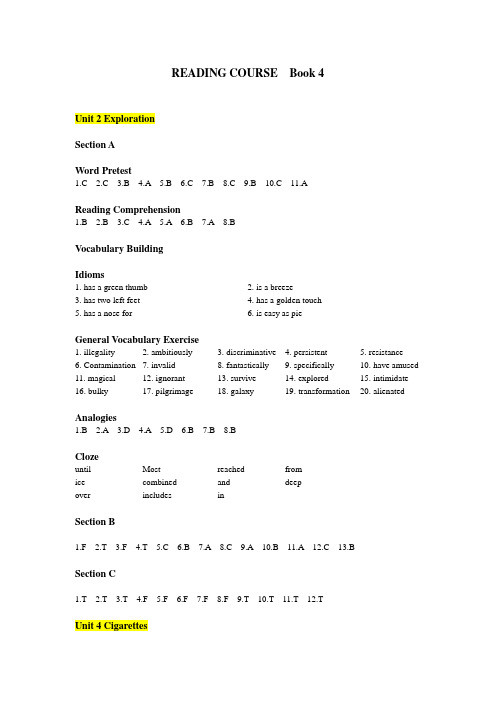
READING COURSE Book 4Unit 2 ExplorationSection AWord Pretest1.C2.C3.B4.A5.B6.C7.B8.C9.B 10.C 11.AReading Comprehension1.B2.B3.C4.A5.A6.B7.A8.BVocabulary BuildingIdioms1. has a green thumb2. is a breeze3. has two left feet4. has a golden touch5. has a nose for6. is easy as pieGeneral Vocabulary Exercise1. illegality2. ambitiously3. discriminative4. persistent5. resistance6. Contamination7. invalid8. fantastically9. specifically 10. have amused 11. magical 12. ignorant 13. survive 14. explored 15. intimidate 16. bulky 17. pilgrimage 18. galaxy 19. transformation 20. alienatedAnalogies1.B2.A3.D4.A5.D6.B7.B8.BClozeuntil Most reached fromice combined and deepover includes inSection B1.F2.T3.F4.T5.C6.B7.A8.C9.A 10.B 11.A 12.C 13.BSection C1.T2.T3.T4.F5.F6.F7.F8.F9.T 10.T 11.T 12.TUnit 4 CigarettesSection AWord Pretest1.B2.B3.B4.B5.A6.A7.C8.B9.CReading Comprehension1.C2.B3.C4.B5.C6.B7.C8.CVocabulary BuildingIdioms1. held his tongue2.see eye to eye3. mind his own business4. rocked the boat5. buried the hatchet6. flowed with the tide7. button her lips 8. let sleeping dogs lifeGeneral Vocabulary Exercise1. retaliatory2. rudimental3. presumptuous4. perplexed5. averted6. conjecture7. satirist8. boisterously9. abundance 10. improvised 11. various 12. intention 13. proposed 14. original 15. created 16. advocating 17. trendy 18. promising 19. consultation 20. graciousAnalogies1.B2.B3.D4.D5.B6.C7.D8.CClozeagainst increased in warnings Moreover smoking observance around bring consumptionSection B1.C2.C3.A4.A5.A6.C7.F8.T9.B 10.C 11.A 12.CSection C1.C2.B3.C4.B5.B6.C7.C8.CUnit 6 ImmigrantsSection AWord Pretest1.A2.A3.C4.A5.B6.C7.B8.C9.BReading Comprehension1.C2.B3.B4.C5.B6.C7.D8.BVocabulary BuildingIdioms1. find middle ground2. all or nothing3. meet people halfway4. sticks to her guns5. middle-of-the-road6. give-and-takeGeneral Vocabulary Exercise1. frustrating2. exaggeration3. inspiring4. industrious5. conversed6. comfortably7. inappropriate8. Distinguished9. traditional 10. descriptively 11. tyrant 12. uncertainty 13. persecuted 14. pursues 15. hostile 16. flight 17. labor 18. chaos 19. exceptional 20. strengthenAnalogies1.B2.C3.C4.D5.C6.B7.B8.CClozesuffered freedom leave aboardjourney elected faced experiencewithout until including helpplant celebrateSection B1.A2.B3.A4.D5.C6.F7.F8.F9.C 10.C 11.B 12.CSection C1.F2.T3.F4.T5.F6.F7.T8.TUnit 10 ChristianitySection AWord PretestReading Comprehension1.C2.B3.C4.C5.A6.B7.B8.CVocabulary BuildingIdioms1. reached the boiling point2. blew up3. gritted his teeth4. held her temper5. was hot-headed6. counted to tenGeneral Vocabulary Exercise1. transient2. partial3. vaguely4. picturesque5. humbleness6. consolation7. showy8. casually9. province 10. meek 11. authorizes 12. weakened 13. resentful 14. confession 15. criticism 16. guidance 17. reliance 18. obedience 19. characterizedAnalogies1.D2.C3.C4.C5.B6.D7.D8.CClozeassociated work Protestant brought distinction with colonies rootat called merged denominationSection B1.A2.B3.C4.C5.B6.F7.T8.F9.T 10.T 11.F 12.C 13.C 14.ASection C1.T2.T3.F4.T5.F6.F7.T8.T9.F 10.TUnit 13 GeneticsSection AWord Pretest1.C2.B3.B4.B5.A6.A7.C8.AReading ComprehensionVocabulary BuildingIdioms1. is hard-hearted2. goes to bat for3. has a heart4. has a heart of gold5. has a heart of stone6. is tight fisted7. is warm-heartedGeneral Vocabulary Exercise1.B2.B3.C4.A5.D6.B7.B8.C9.B 10.B 11.C 12.D 13.C 14.B 15.D 16.A 17.D 18.B 19.B 20.DAnalogies1.A2.A3.B4.C5.D6.A7.D8.CClozeMoreover interested between identicalup relationships establish whetherwith faithfully combinations afterSection B1.T2.T3.F4.B5.D6.B7.T8.F9.F 10.F 11.F 12.F 13.T 14.C 15.ASection C1.F2.T3.F4.T5.F6.F7.T8.T9.T 10.T。
上外版泛读教学教程第四册答案解析
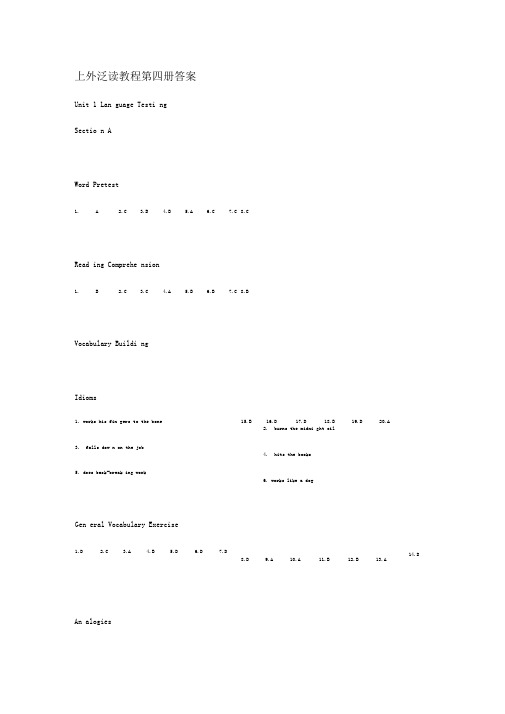
上外泛读教程第四册答案Unit 1 Lan guage Testi ngSectio n AWord Pretest1. A2.C3.B4.B5.A6.C7.C8.CRead ing Comprehe nsion1. B2.C3.C4.A5.B6.B7.C8.B Vocabulary Buildi ngIdioms1. works his fin gers to the bone3.falls dow n on the job5. does back-break ing workGen eral Vocabulary Exercise1.D2.C3.A4.B5.D6.D7.D 15.B 16.D 17.D 18.B 19.D 20.A2.burns the midni ght oil4.hits the books6. works like a dog8.D 9.A 10.A 11.B 12.B 13.AAn alogies14.DClozeits progress leavi ng onerefer both which with leads that since made1.A2.C3.C4.B5.D6.D7.C8.ASectio n B1.B2.C3.B4.A5.C6.C7.C8.B9.C 10.C 11.B 12.BSectio n C1.T2.F3.T4.F5.T6.F7.T8.TUnit 2 Explorati on Sectio n AWord PretestRead ing Comprehe nsion1.B2.B3.C4.A5.A6.B7.A8.B Vocabulary Buildi ngIdioms1. has a gree n thumb 3.has two left feet 5.has a nose for2.is a breeze4.has a golde n touch 6.is easy as pieGen eral Vocabulary Exercise1. illegality2. ambitiously3. discrim in ative4. persiste nt5. resista nee6. Con tam in ati on7. i nvalid8. fan tastically9. specifically10. have amused11. magical 12. ig norant 13. survive 14. explored 15. in timidate 16. bulky 17. pilgrimage 18. galaxy 19. tran sformati on 20.alie natedAn alogies1.B2.A3.D4.A5.D6.B7.B8.BClozeun til Most reached fromice comb ined and deepover in cludes inSectio n B1.F2.T3.F4.T5.C6.B7.A8.C9.A 10.B 11.A 12.C 13.B Sectio n C1.T2.T3.T4.F5.F6.F7.F8.F9.T 10.T 11.T 12.TUnit 3 RefugeeSectio n AWord Pretest1.C2.C3.C4.C5.A6.A7.B8.CRead ing Comprehe nsion Vocabulary Buildi ngIdioms1. dow n to earth2. putt ing on airs3. is show ing off4.thinks he is God ' s gift to mankind5.put …in their place6.blow ing his own hornGen eral Vocabulary Exercise1. D2.D3.A4.B5.A6.A7.A8.B9.B 10.B 11.B 12.D 13.A 14.B 15.A 16.C 17.A 18.A 19.D 20.DAn alogies1.A2.B3.B4.C5.D6.C7.C8.DClozemost take grow cost ing protect ingmiddle found affected for powerlessSect ion BSectio n C1.F2.T3.T4.F5.F6.F7.T8.TUnit 4 CigarettesSectio n AWord Pretest1.B2.B3.B4.B5.ARead ing Comprehe nsion6.A7.C8.B9.C 1.C 2.B 3.C 4.B 5.C 6.B 7.C 8.CVocabulary Buildi ngIdioms1. held his ton gue3.mind his own bus in ess 5.buried the hatchet7.butt on her lips 2.see eye to eye4.rocked the boat6.flowed with the tide 8.let sleep ing dogs lifeGen eral Vocabulary Exercise1. retaliatory2. rudime ntal3. presumptuous4. perplexed5. averted6. conjecture7. satirist8. boisterously9.abundance 10. improvised 11. various 12. i nten tio n 13. proposed 14. orig inal 15. created 16. advocat ing 17. tren dy 18. promis ing 19. con sultati on 20. graciousAn alogies1.B2.B3.D4.D5.B6.C7.D8.CClozeaga inst in creased in warnings Moreoversmok ing observa nee arou nd bring con sumpti on Sectio n B1.C2.C3.A4.A5.A6.C7.F8.T9.B 10.C 11.A 12.CSectio n C1.C2.B3.C4.B5.B6.C7.C8.CUnit 5 Globalizati on Sectio n AWord Pretest1.A2.C3.C4.B5.B6.B7.B8.BRead ing Comprehe nsion1.B2.A3.B4.C5.A6.C7.B8.BVocabulary Buildi ngIdioms1. left us high and dry2. faces up to3. passes the buck5. worm out of6. points 4. will shoulder the resp on sibility hisfin ger atGen eral Vocabulary Exercise1.D2.B3.C4.C5.B6.A7.B8.A9.B 10.B 11.C 12.B 13.C 14.C 15.A 16.A 17.A 18.C 19.C 20.B1.C2.C3.D4.C5.D6.D7.D8.AClozeEn glish in formatio n trouble risi nggrave survival promotes proclaimedben efits exceptio ns accompa nied stemsSectio n B1.C2.B3.C4.F5.T6.T7.A8.A9.C 10.A 11.T 12.F 13.T Sectio n C1.F2.T3.T4.F5.F6.F7.T8.TUnit 6 Immigra ntsSectio n AWord Pretest1.A2.A3.C4.A5.B6.C7.B8.C9.BRead ing Comprehe nsion1.C2.B3.B4.C5.B6.C7.D8.BVocabulary Buildi ngIdiomsGen eral Vocabulary Exercise1. frustrati ng2. exaggerati on3. in spiri ng4. in dustrious5. con versed6. comfortably7. in appropriate8. Disti nguished9.traditi onal10. descriptively11. tyra nt12. un certa inty13. persecuted14pursues15. hostile16. flight 17. labor18. chaos 19. excepti onal 20. stre ngthe n1. find middle ground 3. meet people halfway 5. middle-of-the-road2. all or no thi ng4. sticks to her guns6. give-a nd-take1.B2.C3.C4.D5.C6.B7.B8.CClozesuffered freedom leave aboardjourney elected faced experie neewithout un til in cludi ng helppla nt celebrateSect ion B1.A2.B3.A4.D5.C6.F7.F8.F9.C 10.C 11.B 12.C Sectio n C1.F2.T3.F4.T5.F6.F7.T8.TUn it 7 EcologySection AWord Pretest1.C2.B3.A4.B5.A6.C7.C8.A9.A 10.BRead ing Comprehe nsion1.B2.C3.C4.A5.A6.C7.B8.CVocabulary Buildi ngIdioms1. give up2. go through with3. hang in there4. stick with5. sweat …outGen eral Vocabulary Exercise1.C2.C3.C4.A5.C6.C7.A8.C9.B 10.D 11.B 12.B 13.B 14.D 15.C 16.C 17.A 18.D 19.A 20.AAn alogies1.C2.B3.B4.D5.A6.C7.D8.CClozen atural without strict resultsbranch made more onproblem less realize ecologyRead ing Comprehe nsion1.A2.B3.B4.C5.C6.B7.B8.CVocabulary Buildi ngIdioms1. is on her own2. 3. lead her by the noseSection B1.B2.C3.B Section C1.T2.T3.F Unit 8 HolocaustSection AWord Pretest1.C2.B3.A4.F5.T6.C 4.T 5.F 6.F 4.B 5.B 6.B7.A8.C9.A 7.T 8.F 9.T 7.B 8.B 9.B 10.B 11.B10.F10.Bis a copycat4. cut the apronstrings5. is a yes-ma n6. has a mind of her own7. sta nd on his own two feetGen eral Vocabulary Exercise1. aggravated2. resolve3. method/methodology4.adm oni shme nts/adm on iti ons5. cli nic6.c ongenial7. acute8. derisi on9. dramatic 10. impleme nt 11. artistic 12. marked/ remarkable 13. terrorized 14. men tality 15. diverted 16. mon strous17 percepti ons 18. extremity 19. spontan eous 20. dictatedAn alogies1.A2.D3.B4.C5.C6.D7.D8.CClozewhich by attached inbut as regarded belege ndary rooted moved knownSection B1.A2.B3.C4.A5.T6.F7.TSection C1.T2.T3.F4.F5.T6.T7.FUnit 9 Diplomatic PracticeSection AWord Pretest1.B2.C3.A4.B5.B6.C7.CRead ing Comprehe nsion1.C2.A3.B4.C5.B6.B7.C8.B 9.B 10.C 11.B 12.B 13.A 8.T 9.F 10.F8.B8.BVocabulary Buildi ng Idioms1. was as tough as n ails 3. keep your chin up2. went to pieces 4. hold his head up7. pulled herself togetherGen eral Vocabulary Exercise1. C2.B3.B4.D5.B6.B7. B8.A9.B 10.C 11.D 12.A 13.A14.C15.C 16.B 17.B 18.B 19.B 20.DAn alogies1.B2.B3.A4.D5.A6.C7.D8.DClozeThere within law un der also examples which for usedSection B1.C2.C3.A4.A5.F6.T7.T8.F9.C 10.A 11.F 12.T 13.TUnit 10 Christia nitySection AWord PretestRead ing Comprehe nsion1.C2.B3.C4.C5.A6.B7.B8.CVocabulary Buildi ngIdioms1. reached the boil ing pointGen eral Vocabulary Exercise1. tran sie nt2. partial3. vaguely4. picturesque5. humble ness6. con solati on7. showy8. casually9. provi nee 10. meek 11. authorizes 12. weake ned13. rese ntful 14. con fessi on 15. criticism16. guida nee17. relia nee 18. obedie nee 19. characterizedAn alogiesCloze2. blew up3. gritted his teeth 5. was hot-headed4. held her temper6. coun ted to ten1.D2.C3.C4.C5.B6.D7.D8.Cassociated work Protesta nt broughtdisti nctio n with colonies rootat called merged denomin ati on Section B1. A2.B3.C4.C5.B6.F7.T8.F9.T 10.T 11.F 12.C 13.C14.ASection C1.T2.T3.F4.T5.F6.F7.T8.T9.F 10.TUn it 11 PoliticsSection AWord Pretest1.B2.C3.B4.C5.B6.B7.C8.A9.B 10.ARead ing Comprehe nsionVocabulary Buildi ng2. gave me the cold shoulder4. welcomed us with ope n arms6. turns her back onGen eral Vocabulary Exercise1.D2.D3.A 4•丿A 5.D 6.B 7.D 8.B9.C 10.C11.A 12.D 13.C 14.C15.A16.A17.D18.C19.D20.BAn alogies1.B2.B3.C4.C5.B6.D7.C8.DClozemin ds aidedrequirespeacerelatio nshiplittle foralo ne recreati on doi ngSection BIdioms1. icy stare3. was cool toward me5. turns his nose up atSection A1.T2.T3.F4.T5.F6.F7.F8.T9.F 10.TUn it 12 ArtSection AWord Pretest1.C2.B3.B4.A5.A6.B7.A8.B9.C 10.ARead ing Comprehe nsion1.C2.A3.B4.B5.C6.A7.B8.CVocabulary Buildi ngIdioms1. is a loner2. two heads are better tha n one3. brain storms4.goes it alone5. put their heads together6. jo ined forces7. pools her resources 8. lend …a handGen eral Vocabulary Exercise1. relucta nt2. divers ifying/ to diversify3. optimists4. sere nely5. expectatio ns6. impos ing7.expended8. rarity9. perceptive 10. symbolically 11. traditio nal 12. essenee13. i nflue ntial 14. imagi nati on 15.visualize 16.con struct ion17. multiplied 18. ir on ic/ ir on ical 19. depth 20. in spiredAn alogies1.B2.A3.D4.A5.A6.D7.B8.CClozewith lay problem Among pai nter depicts myth as expressi on an cie nts at correct ness are proport ions toSection B1.C2.C3.B4.A5.C6.F7.T8.T9.B 10.C 11.A 12.ASection CUnit 13 Ge neticsSection AWord Pretest1.C2.B3.B4.B5.A6.A7.C8.ARead ing Comprehe nsion1.B2.B3.C4.A5.C6.C7.C8.C Vocabulary Buildi ngIdioms1.is hard-hearted3.has a heart5.has a heart of stone 7. is warm-hearted 2.goes to bat for4.has a heart of gold 6.is tight fistedGen eral Vocabulary ExerciseAn alogies1.A2.A3.B4.C5.D6.A7.D8.CClozeMoreover in terested betwee n ide nticalup relati on ships establish whetherwith faithfully comb in ati ons afterSection B1.T2.T3.F4.B5.D6.B7.T8.F9.F 10.F 11.F 12.F 13.T 14.C 15.A Section C1.F2.T3.F4.T5.F6.F7.T8.T9.T 10.TUnit 14 Society and ValuesSection AWord PretestRead ing Comprehe nsion1. B2.C3.C4.B5.C6.A7.C8.CVocabulary Buildi ngIdiomsGen eral Vocabulary Exercise1. an ticipate2. justifiable3. ambiti on4. determ in ati on5. agreed6. befrie nded7. Perishable8. expressi on9. theoretical10. profun dity11. worships12. mythic/ mythical 13. passi on ate14. worthwhile/worthy 15. l onging16. crime 17 fasc in at ing 18. obsessive 19 ).exposure 20. ridiculedAn alogiesCloze1. is on cloud nine 3. is in seve nth heave n5. is tickled pink 7. is walki ng on air2. is dow n in the dumps4. is out of sorts6. is feeling blue8. is on top of the world1.B2.A3.D4.B5.A6.D7.D8.Bmak ing which on right markedwith away created with asSection B1.C2.C3.C4.D5.A6.B7.B8.C9.D 10.D 11.T 12.T 13.F 14.C 15.BSection C1.F2.T3.T4.F5.T6.F7.F8.F9.T 10.T 11.T 12.TUn it 15 Econo micsSection AWord Pretest1.C2.B3.B4.A5.C6.C7.A8.BRead ing Comprehe nsionVocabulary Buildi ng2. beats around the bush4. is off base6. hits the n ail on the headGen eral Vocabulary Exercise15.C 16.C 17.B 18.D 19.B 20.AAn alogiesClozecauses out worse Thaton dominant susta ining toexpect ing rise form howeverSection BIdioms1. is right on target3. misses the mark 5. gets to the heart of1.A2.B3.A4.D5.B6.D7.C8.B9.C 10.D 11.A 12.A 13.A 14.B1.B2.C3.A4.C5.B6.A7.D8.CSection CGen eral Vocabulary Exercise1. repug nant2. brutally3. intan gibles4. det on ated5. an alysis1.F2.F3.T4.F5.F6.T7.T8.T9.F 10.FUnit 16 Tech nologySection AWord Pretest 1.C 2.B 3.C 4.A 5.C 6.A 7.B 8.CRead ing Comprehe nsion1.B2.A3.B4.A5.C6.C7.B8.C9.CVocabulary Buildi ngIdioms1. is an old hand at3. know the ropes5. is…green2. knows…like the back of her hand4. was not born yesterday6. live-a nd-lear n6. placid7. eno rmously8. glee9.vexed 10. Rigorous11. various 12. applied 13. competitive 14. storage 15.kno wledgeable16. specialty 17. promis ing 18. commerce 19. i ntricate 20. ben eficialAn alogies1.D2.D3.C4.A5.D6.D7.C8.BClozeforce dated what in tellige nt protectivespecies produc ing protest somethi ng ext in cti onSection B1.C2.C3.C4.T5.F6.T7.F8.B9.C 10.B 11.A 12.A 13.C 14.A 15.B Section C1.F2.F3.T4.F5.T6.F7.T8.FUnit 17 PhilosophySectio n AWord Pretest1.A2.B3.B4.C5.C6.A7.B8.C9.A 10.CRead ing Comprehe nsion1.B2.C3.B4.B5.C6.C7.B8.CVocabulary Buildi ngIdioms1. is two-faced2. tells it like it is3.talks behi nd her friends ' backs4. bared her soul5.looked her mother in the eyey her cards on the tableGen eral Vocabulary Exercise1.D2.D3.A4.B5.C6.D7.D8.A9.C 10.D 11.B 12.B 13.D 14.A 15.C 16.C 17.C 18.A 19.B 20.BAn alogiesClozeVocabulary Buildi ngIdioms1. eyes were bigger tha n his stomach3. bit off more tha n she could chew6. spread herself too thin7. tak ing it easyGen eral Vocabulary Buildi ngBorn associated who hostilityafter which there toown lastfoun dedin cludi ngbefore wasSection B1.C2.B3.B4.B5.B6.B7.B8.C9.B 10.B 11.F 12.F 13.TUnit 18 EssayQuestio ns on“ Of Negotiati ng1.A2.C3.A4.B5.B6.B7.B8.C9.C10.B2. lost his head4. eats like a horse5. bur ned herself out1. associati on2. reliability3. opposite4. con troversy5. disposal6. Polluted7. attractively8. Con formity9. retiri ng 10. evasive 11.speech 12. service 13. i nferior 14. faithfully 15. quicke n 16. crafty 17. awesome 18. ripe ned 19. solitary 20. trulyAn alogies1.C2.D3.D4.C5.C6.D7.B8.AClozecharacter comparis on lacked while in todeep virtue caused excess alsois like scie ntific which to。
大学英语泛读教程第四册全文翻译..

大学英语泛读教程第四册全文翻译..Unit 1Text天才与工匠许多人羡慕作家们的精彩小说,但却很少有人知道作家们是如何辛勤笔耕才使一篇小说问世的。
以下的短文将讨论小说的酝酿过程,以及作家是如何将这小说雕琢成一件精致完美的艺术品。
1.有一次,我在暮色中来到小树林边一棵鲜花盛开的小桃树前。
我久久站在那里凝视着,直到最后一道光线消逝。
我看不到那树原先的模样,看不见曾穿透果核,能崩碎你的牙齿的力量,也看不到那使它与橡树和绿草相区别的原则。
显现在我面前的,是一种深邃而神秘的魅力。
2. 当读者读到一部杰出的小说时,他也会这样如痴如狂,欲将小说字字句句刻骨铭心,不提出任何问题。
3.但即使是个初学写作者也知道,除那将小说带到世上的文字之外,还有更多的构成小说生命的因素,小说的生命并不始于写作,而始于内心深处的构思。
4. 要创作出有独创性的作品,并不要求懂得创造的功能。
多少世纪以来的艺术、哲学及科学创造都出自人们的头脑,而创造者也许从未想到去关注创造的内在过程。
然而,在我看来,对创造工作一定程度的了解,至少会使我们通过知道两个事实,增长我们处理正在出现的故事的智慧。
5. 首先,天赋不是掌握了技艺的艺术家独有的特性,而是人脑的创造性功能。
不仅所有对技艺的掌握都含有天赋,而且每个人都具有天赋,无论他的天赋发展是何等不充分。
对技艺的掌握是天赋的显现,是经过培养的,发展了的和受过训练的天赋。
你的天赋在最原始的层面上起作用。
它的任务就是创造。
它是你的故事的创造者。
6. 第二,将你的小说带进世界的文字是艺术家的工作,它就和一个泥瓦匠的工作一样,有意识、谨慎而实实在在。
天赋正如理解力、记忆力和想象力一样是我们的精神禀赋中的天然部分,而技艺却不是。
它必须通过实践才能学到,并要通过实践才能掌握。
如果要使在我们内心深处浮现的故事跃然纸上,光彩照人,那么,每个故事都须有感染力极强的优雅文笔。
只有健全的技艺才能使我们做到这一点。
7.一个故事是如何酝酿成的呢?据说,我们从一生中的前二十年,或许前五年起就开始写作。
英语泛读教程_4-Unit_2_Exploration

That’s one small step for man and a giant leap for mankind.
Neil Armstrong
No. 3
Clue 1: He is an expert in astrophysics (天体物理学), theoretical physics (理论物理学) and mathematics.
major explorations after the Age of Discovery for scientific
exploration in the modern era. Ⅲ.Famous explorers 1. 艾德蒙·希拉里(1919年-2008年)第一位登上喜马拉雅山
的珠穆朗玛峰 2. 尤里·加加林(1934年-1968年)第一名进入太空的人 3. 尼尔·阿姆斯特朗(1930年-)第一名踏上月球的人 4. 植村直己(1941年-1984年)曾独自一人到达南极极点 5. 托尔·海尔达尔(1914年-2002年)以木筏康提基号,从秘
The Extra-terrestrial
A Letter to Beagle
Beagle
Beagle? Mars express? ESA?
小猎犬2號是英国一个未能完成任务的着陆航天器,是欧洲空间局2003年火星快車 號任务的一部分。现在仍无法确定登陆器是否已到达了火星表面;它从火星特快车 上释放出来后的第六天,正准备按计划进入大气层时,失去了它所有的联系。也许 它根本就没上去火星,而是被弹出了大气层,进入环日轨道;或是在降落过程中被 大气燃烧殆尽。亦或是达到了火星表面,却撞到了超硬的物体,更或是由于某个错 误而无法与地球联系。小猎犬2的名字来自曾两次跟随对达尔文远征的小猎犬号帆船 ,这两次远征促使达尔文形成了进化论。这个登陆器也被认为是“猎犬号”,并在 后面加上探测器的数字。
英语泛读(4)教案
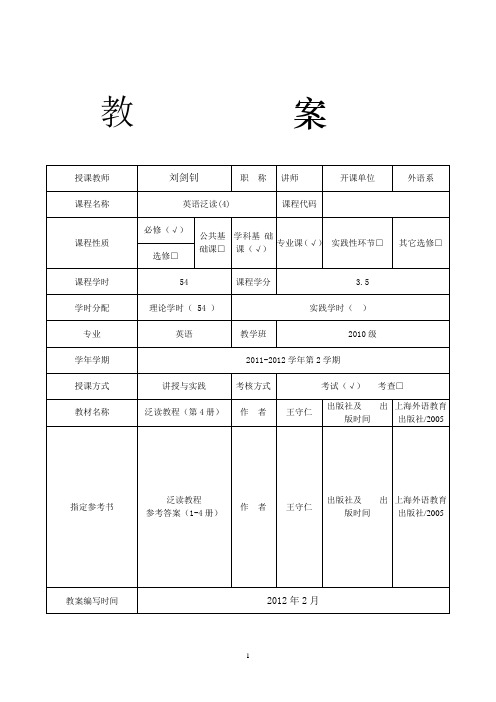
Step three: detailed explanation of the text.
Word match exercise. Give students three groups of new words and definitions and match the word with the definitions. Some basic knowledge on suffix. Many verbs end in suffix –ize, such as realize, organize, criticize, characterize; many adverbs end in thesuffix –ly, such as efficiently, certainly, professionally. If we study carefully, we can save a lot of time memorizing new words.
《泛读教程》第四册参考答案

泛读教程第四册参考答案Unit1Language TestingSection AWord Pretestl.A 2.C3.B 4.B 5.A 6.C7.CReading Comprehensionl.B 2.C3.C 4.A 5.B 6.B7.CVocabulary BuildingIdioms1.works his fingers to the bone3.falls down on the job5.does back-breaking workGeneral Vocabulary Exercisel.D 2.C 3.A 4.B 5.D 6.D7.D 16.D17.D18.B19.D20.AAnalogiesl.A 2.C 3.C 4.B 5.D 6.D7.C 8.C8.B2.bums the midnight oil4.hits lhe books6.works like a dog8.D9.A10.A ll.B12.B13.A8.A14.D15.BClozeits progress refer both leads thatSection B leaving one which with since madel.B 2.C 3.B 4.A 5.C 6.C7.CSection C8.B9.C I0.C ll.B12.B LT 2.F 3.T 4.F 5.T 6.F7.T8.TUnit2ExplorationSection AWord Pretestl.C 2.C 3.B 4.A 5.B 6.C 7.B 8.C 9.B IO.C ll.AReading Comprehensionl.B 2.B 3.C 4.A 5.A 6.B 7.A 8.BVocabulary Building5. resistance10. have amused 15. intimidate20. alienatedIdioms1. has a green thumb3. has two left feet 5. has a nose for2. is a breeze4. has a golden touch6. is easy as picGeneral Vocabulary Exercise1. illegality2. ambitiously3. discriminative4. persistent 6. Contamination 7. invalid8. fantastically 9. specifically11. magical 12. ignorant 13. survive 14. explored 16. bulky17. pilgrimage18. galaxy 19. transformationAnalogiesl.B 2.A 3.D 4.A 5.D 6.B 7.8;8.BClozeuntil Mostreached from icecombinedanddeepover includes inSection Bl.F 2.T 3.F 4.T 5.C 6.B 7.A8.C 9.A 10.B ll.A 12.C 13.Section Cl.T 2.T 3.T 4.F 5.F 6.F 7.F8.F 9.T 10.T ll.T 12.TUnit 3 Refugee Section AWord Pretestl.C 2.C 3.C 4.C 5.A 6.A 7.B 8.CReading Comprehensionl.C 2.D 3.D 4.A 5.D 6.A 7.C 8.B 9.CVocabulary BuildingIdioms1. down to earth3.is showing off5.put...in their place 2.putting on airs4.thinks he is God's gift to mankind 6.blowing his own hornGeneral Vocabulary Exercisel.D 2.D 3.A 4.B 5.A 6.A7.A8.B9.B10.B ll.B12.D13.A I4.B15.A 16.C17.A18.A I9.D20.DAnalogiesLA 2.B 3.B 4.C 5.D 6.C7.C8.DClozemost take grow costing protectingmiddle found a f luted for powerlessSection Bl.D 2.C 3.D 4.F 5.T 6.T7.T8.T9.F10.T ll.B12.B13.C14.BSection Cl.F 2.T 3.T 4.F 5.F 6.F7.T8.TUnit4CigarettesSection AWord Pretestl.B 2.B 3.B 4.B 5.A 6.A7.C8.B9.CReading Comprehensionl.C 2.B 3.C 4.B 5.C 6.B7.C8.CVocabulary BuildingIdioms1.held his tongue3.mind his own business 5.buried the hatchet7.button her lips 2.scc eye to eye4.rocked the boat6.flowed with the tide 8.let sleeping dogs lifeGeneral Vocabulary Exercise1.retaliatory 6.conjecture2.rudimental7.satirist3.presumptuous8.boisterously4.perplexed9.abundance5.averted10.improvised11.various 16.advocating 12.intentioni7.trendy13.proposed18.promising14.original15.created19.consultation20.graciousAnalogiesl.B 2.B 3.D 4.D 5.B 6.C7.D8.C Clozeagainst smoking increasedobscnanccinaroundwarningsbringMoreoverconsumptionSection Bl.C 2.C 3.A 4.A 5.A 6.C7.F8.T9.B I0.C ll.A12.C Section Cl.C 2.B 3.C 4.B 5.B 6.C8.CUnit5GlobalizationSection AWord Pretestl.A 2.C 3.C 4.B 5.B 6.B7.B8.BReading Comprehensionl.B 2.A 3.B 4.C 5.A 6.C7.B8.BVocabulary BuildingIdioms1.left us high and dry2. faces up to 4.will shoulder the responsibility5.worm out of3.passes the buck 6.points his finger atGeneral Vocabulary Exercisel.D 2.B 3.C 4.C 5.B 6.A7.B8.A14.C15.A16.A17.A18.C19.C20.B9.B10.B ll.C12.B13.C Analogiesl.C 2.C 3.D 4.C 5.D 6.D7.D8.AClozeEnglish information trouble rising gravesunivalpromotesproclaimedbenefits exceptions accompanied stemsSection Bl.C 2.B 3.C 4.F5.T6.T7.A 8.A 9.C 10. A ll.T 12.F 13.TSection Cl.F 2.T 3.T 4.F 5.F 6.F 7.T 8.T Unit 6 Immigrants Section AWord Pretestl.A 2.A 3.C 4.A5.B6.C7.B 8.C 9.BReading Comprehensionl.C 2.B 3.B 4.C 5.B 6.C 7.D 8.BVocabulary Building Idioms1. find middle ground2. all or nothing3. meet people halfway4. sticks to her guns5. middle-of-the-road6. give-and-takeGeneral Vocabulary Exercise1. frustrating2. exaggeration3. inspiring4. industrious5. conversed6. comfortably7. inappropriate8. Distinguished 9. traditional10. descriplivcly 11. tyrant i 2. uncertainty 13. persecuted 14. pursues15. hostile16. flight17. labor 18. chaos 19. exceptional 20. strengthenAnalogiesl.B 2.C 3.C 4.D 5.C 6.B7.B 8.CClozesufferedfreedom leave aboardjourney elected faced experiencewithout until including helpplant celebrateSection Bl.A 2.B 3.A 4.D 5.C 6.F7.F8.F9.C10.C ll.B12.CSection Cl.F 2.T 3.F 4.T 5.F 6.F7.T8.TUnit7Ecology-Section AWord Pretestl.C 2.B 3.A 4.B 5.A 6.C7.C8.A9.A10.BReading ComprehensionIB 2.C 3.C 4.A 5.A 6.C7.B8.CVocabulary BuildingIdioms1.give up2.go through with3.hang in there4.stick with5.sweat...outGeneral Vocabulary Exercisel.C 2.C 3.C 4.A 5.C 6.C7.A8.C9.B10.D ll.B12.B13.B14.D15.C 16.C17.A18.D19.A20.AAnalogiesl.C 2.B 3.B 4.D 5.A 6.C7.D8.CClozebranch made more onproblem less realize ecologynatural without strict resultsSection Bl.B 2.C 3.B 4.F 5.T 6.C7.A8.C9.A10.B ll.BSection Cl.T 2.T 3.F 4.T 5.F 6.F7.T8.F9.T10.FUnit8HolocaustSection AWord Pretestl.C 2.B 3.A 4.B 5.B 6.B7.B8.B9.B10.BReading Comprehension8.Cl.A 2.B 3.B 4.C 5.C 6.B7.BVocabulary-BuildingIdioms1.is on her own2.is a copycat3.lead her by the nose4.cut the apron strings5.is a yes-man6.has a mind of her own7.stand on his own two feetGeneral Vocabulary Exercise1.aggravated2.resolve3.method/mcthodology4.admonishments/admonitions5.clinic6.congcnial7.acute8.derision9.dramatic10.implement11.artistic12.marked/remarkable13.terrorized14.mentality15.diverted16.monstrous17perceptions i8.extremity19.spontaneous20.dictatedAnalogiesl.A 2.D 3.B 4.C 5.C 6.D7.D8.CClozewhich by attached inbut as regarded belegendary rooted moved knownSection B1.A2.B3.C4.A5.T6.F7.T8.B9.B10.C ll.B12.B13.ASection Cl.T 2.T 3.F 4.F 5.T 6.T7.F8.T9.F10.FUnit9Diplomatic PracticeSection AWord Pretestl.B 2.C 3.A 4.B 5.B 6.C7.C8.BReading Comprehensionl.C 2.A 3.B 4.C 5.B 6.B7.C8.B Vocabulary BuildingIdioms1.was as tough as nails 3.keep your chin up5.was cool as a cucumber 7.pulled herself together 2.went to pieces 4.hold his head up6.fell apartGeneral Vocabulary ExerciseLC 2.B 3.B 4.D 5.B 16.B I7.B18.B19.B6.B20.D7.B8.A9.B10.C ll.D12.A13.A14.C15.CAnalogiesl.B 2.B 3.A 4.D 5.A 6.C7.D ClozeThere withinexamples which for under also usedSection Bl.C 2.C 3.A 4.A 5.F 6.T7.T8.F9.C10.A U.F13.T Unit10ChristianitySection AWord Pretestl.C 2.C 3.B 4.B 5.A 6.C7.A8.BReading Comprehensionl.C 2.B 3.C 4.C 5.A 6.B7.B8.CVocabulary BuildingIdioms1.reached the boiling point 3.gritted his teeth2.blew up4.held her temper5.was hot-hcadcd6.counted to tenGeneral Vocabulary Exercise1.transient2.partial3.vaguely4.picturesque5.humbleness6.consolation7.showy8.casually9.province10.meek11.authorizes12.weakened 13.resentful14.confession15.criticism16.guidance 17.reliance18.obedience19.characterizedAnalogiesl.D 2.C 3.C 4.C 5.B 6.D7.D8.CClozeassociated work Protestant brought distinction with colonies rootat called merged denomination Section Bl.A 2.B 3.C 4.C 5.B 6.F7.T8.F9.T10.T ll.F12.C13.C14.ASection Cl.T 2.T 3.F 4.T 5.F 6.F7.T8.T9.F I0.TUnit11PoliticsSection AWord PretestIB 2.C 3.B 4.C 5.B 6.B7.C8.A9.B10.AReading Comprehension1.B2.D3.C4.C5.C6.D7.B8.DVocabulary BuildingIdioms1.icy stare3.wal cool toward me 5.turns his nose up at 2.gave me the cold shoulder4.welcomed us with open arms 6.turns her back onGeneral Vocabulary Exercisel.D 2.D 3.A 4.A 5.D 6.B7.D8.B9.C16.A17.D18.C19.D20.B10.C ll.A12.D13.C14.C15.AAnalogiesl.B 2.B 3.C 4.C 5.B 6.D7.C8.D Clozeminds aided little for requiresalonepeacerecreationrelationshipdoingSection Bl.C 2.A 3.C 4.T 5.F 6.T7.F8.C9.D10.B11.B12.A13.C14.B15.CSection Al.T 2.T 3.F 4.T 5.F 6.F7.F8.T9.F10.TSection AWord Pretestl.C 2.B 3.B 4.A 5.A 6.B7.A8.B9.C10.AReading Comprehensionl.C 2.A 3.B 4.B 5.C 6.A7.B8.CVocabulary BuildingIdioms1.is a loner2.two heads arc better than one3.brainstorms4.goes it alone5.put lheir heads together6.joined forces7.pools her resources8.lend...a handGeneral Vocabulary Exercise1.reluctant2.diversifying/to diversify3.optimists4.serenely5.expectations6.imposing7.expended8.rarity9.perceptive10.symbolically11.traditional12.essence13.influential14.imagination15.v isualize16.construction 17.multiplied18.ironic/ironical19.depth20.inspiredAnalogiesl.B 2.A 3.D 4.A 5.A 6.D7.B8.CClozewith lay problem Among painterdepicts myth as expression ancientscorrectness arc proportions to Section Bl.C 2.C 3.B 4.A 5.C 6.F7.T8.T9.B10.C ll.A12.ASection Cl.F 2.T 3.T 4.F 5.T 6.T7.F8.TUnit13GeneticsSection AWord Pretestl.C 2.B 3.B 4.B 5.A 6.A7.C8.AReading Comprehensionl.B 2.B 3.C 4.A 5.C 6.C7.C8.CVocabulary BuildingIdioms!. is hard-hearted3.has a heart5.has a heart of stone 7.is warm-hearted 2.goes to bat for4.has a heart of gold 6.is tight fistedGeneral Vocabulary Exercisel.B 2.B 3.C 4.A 5.D 6.B7.B8.C9.B10.B ll.C12.D13.C14.B15.D 16.A17.D18.B19.B20.DAnalogiesl.A 2.A 3.B 4.C 5.D 6.A7.D8.CClozeMoreover interested between identicalup relationships establish whetherwith faithfully combinations afterSection Bl.T 2.T 3.F 4.B 5.D 6.B7.T8.F9.F10.F ll.F12.F13.T14.C15.ASection Cl.F 2.T 3.F 4.T 5.F 6.F7.T8.T9.T iO.T Unit14Society and ValuesSection AWord PretestIB 2.B 3.C 4.C 5.C 6.A7.C8.B9.C10.AReading Comprehensionl.B 2.C 3.C 4.B 5.C 6.A7.C8.CVocabulary BuildingIdioms!. is on cloud nine3.is in seventh heaven 5.is tickled pink7.is walking on air 2.is down in the dumps 4.is out of sorts6.is feeling blue8.is on top of the worldGeneral Vocabulary Exercise1.anticipate2.justifiable3.ambition4.determination5.agreed6.befriended7.Perishable8.expression9.theoretical10.profundity1L worships12.mythic/mythical13.passionate14.worthwhile/worthy15.longing 16.crime17fascinating18.obsessive19.exposure20.ridiculedAnalogiesl.B 2.A 3.D 4.B 5.A 6.D7.D8.BClozemaking which on right markedwith away created with asSection Bl.C 2.C 3.C 4.D 5.A 6.B7.B8.C9.D10.D ll.T12.T13.F14.C15.BSection Cl.F 2.T 3.T 4.F 5.T 6.F7.F8.F9.T10.T ll.T12.TUnit15EconomicsSection AWord Pretestl.C 2.B 3.B 4.A 5.C 6.C7.A8.BReading Comprehensionl.C 2.A 3.B 4.A 5.B 6.A7.C8.B Vocabulary BuildingIdioms1.is right on target 3.misses the mark 5.gets to the heart of2.beats around the bush 4.is off base6.hits the nail on the headGeneral Vocabulary Exercisel.A 2.B 3.A 4.D 5.B 6.D16.C17.B18.D19.B20.A7.C8.B9.C10.D ll.A12.A13.A14.B15.CAnalogiesl.B 2.C 3.A 4.C 5.B 6.A7.D8.CClozecauses out worse Thaton dominant sustaining toexpecting rise form howeverSection Bl.C 2.B 3.T 4.F 5.T 6.B7.C8.F9.T10.T ll.F12.TSection Cl.F 2.F 3.T 4.F 5.F 6.T7.T8.T9.F10.FUnit16TechnologySection AWord Pretestl.C 2.B 3.C 4.A 6.A7.B8.CReading Comprehensionl.B 2.A 3.B 4.A 5.C 6.C7.B8.C9.CVocabulary BuildingIdioms1.is an old hand at2.knows...like the back of her hand3.know the ropes 5.is...green4.was not bom yesterday 6.live-and-lcamGeneral Vocabulary ExerciseL repugnant 2.brutally 3.intangibles 4.detonated 5.analysis6.placid7.enormously8.glee9.vexed10.Rigorouspetitive14.storage15.knowledgeable merce19.intricate20.beneficialAnalogiesl.D 2.D 3.C 4.A 5.D 6.D7.CClozeforce dated :8.Bwhat intelligent protectivespecies producing protest something extinction Section Bl.C 2.C 3.C 4.T 5.F 6.T7.F8.B9.C10.B ll.A12.A13.C I4.A15.B Section Cl.F 2.F 3.T 4.F 5.T 6.F7.T8.FUnit17PhilosophySection AWord Pretestl.A 2.B 3.B 4.C 5.C 6.A7.B8.C9.A10.CReading Comprehensionl.B 2.C 3.B 4.B 5.C 6.C7.B8.CVocabulary BuildingIdioms1.is two-laced2.tells it like it is3.talks behind her friends'backs 5.looked her mother in the eyeGeneral Vocabulary Exercisel.D 2.D 3.A 4.B 5.C 6.D 16.C17.C18.A19.B20.B4.bared her souly her cards on the tabic7.D8.A9.C10.D ll.B12.B13.D14.A15.CAnalogiesl.A 2.D 3.B 4.A 5.A 6.B7.C8.BClozeBom associated who hostilityafter which there toown last founded includingbefore wasSection Bl.C 2.B 3.B 4.B 5.B 6.B7.B8.C9.B10.B1I.F I2.F13.T Unit18EssayQuestions on“Of Negotiating”LA 2.C3.A 4.B 5.B 6.B7.B8.C9.C10.BVocabulary BuildingIdioms!. eyes were bigger than his stomach 3.bit off more than she could chew 5.burned herself out7.taking it easy 2.lost his head4.cats like a horse6.spread herself too thinGeneral Vocabulary Building1.association2.reliability3.opposite4.controversy5.disposal6.Polluted7.attractively8.Conformity9.retiring10.evasive 11.speech12.service13.inferior14.faithfully15.quicken 16.crafty17.awesome18.ripened19.solitary20.irulyAnalogiesl.C 2.D 3.D 4.C 5.C 6.D7.B8.AClozecharacter comparison lacked while intodeep virtue caused excess alsois like scienlific which to。
英语泛读(4)教案
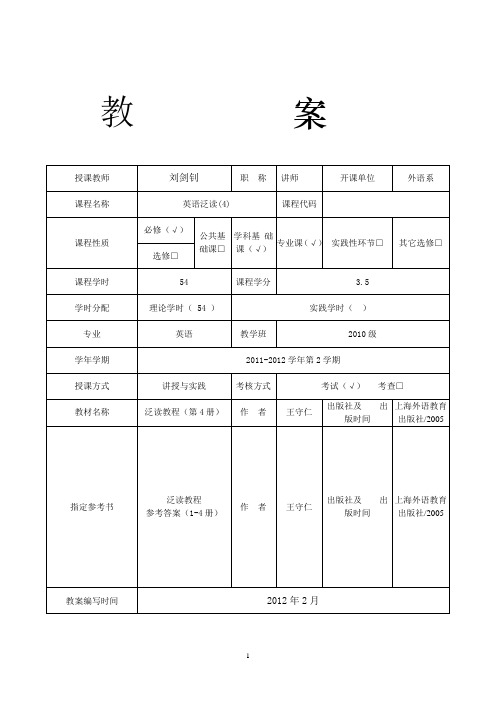
1.What is Beagle
What does “artificial sun”mean?
V.Exercises:
1.Vocabulary
2.Analogies
3.Cloze
教学手段与方法:
1.讲授、练习和ppt.
2.Group discussion
思考题、讨论题、作业:
1.What is the significance of space exploration?
考试(√)考查□
教材名称
泛读教程(第4册)
作者
王守仁
出版社及出版时间
上海外语教育出版社/2005
指定参考书
泛读教程
参考答案(1-4册)
作者
王005
教案编写时间
2012年2月
英语泛读(4)课程教案
授课题目(教学章节或主题):
Unit 1 Language Testing
2.《新编实用英语快速阅读教程》
授课题目(教学章节或主题):
Unit 2 Exploration
授课方式
讲授、练习
授课学时
6
教学目标或要求:
1. Introduce some information on exploration
2. Enlarge students’ vocabulary
3.Do more exercise on skimming and scanning
教学内容(包括基本内容、重点、难点):
I. Reading skill: context clues to word meaning
Try to guess the meaning from context. E.g.
高教版大学英语泛读教程4(第三版)电子教案Unit 2

A Do You Get It?
Multiple Matching
Scan each of the five paragraphs (a-e) again. Below are a series of newspaper headlines that refer to ideas or information contained in each paragraph. Match the headline to the paragraph.
U2-p.15
The naysayers eventually won the day. In 2010, the NIR system was abandoned; the ID cards were scrapped the following year. Regardless of this climbdown, many British citizens remain convinced that the gts nose into the private affairs of its citizens.
• Are there fears over government misuse of personal information? If yes, where are the fears from?
U2-p.13
Reading Track 4
A Database State
It’s an uncomfortable fact, but every country watches the movements of its citizens. There are varying degrees of surveillance. However, you might be surprised to learn that the U.K. has been described as one of the most surveyed countries in the world. The main reason for this is that it has more closecircuit television (CCTV) cameras in use than any other democratic country. Despite statistics suggesting that over 90 percent of these cameras are in private hands, people remain concerned about official snooping. The government insists the cameras are there to prevent crime and to keep people safe; yet statistics show that a tiny percentage of criminal cases are solved using CCTV evidence. In spite of this, the authorities continue to champion the use of public surveillance. It seems the Big Brother society foretold by the British author George Orwell in his famous novel 1984 has come to pass; indeed, for many people, this is just the tip of the iceberg.
- 1、下载文档前请自行甄别文档内容的完整性,平台不提供额外的编辑、内容补充、找答案等附加服务。
- 2、"仅部分预览"的文档,不可在线预览部分如存在完整性等问题,可反馈申请退款(可完整预览的文档不适用该条件!)。
- 3、如文档侵犯您的权益,请联系客服反馈,我们会尽快为您处理(人工客服工作时间:9:00-18:30)。
outer space space travel
a. the artificial satellite b. the area outside the earth c. person who travels in a spaceship d. the sun and the planets
Uranus
Neptune
the earth
planet
the sun
star
the moon
natural
satellites
man-made satellite
artificial / man-made
Halley's comet
Comet
Ⅰ.Definition of exploration Exploration is the act of searching or traveling around a terrain (including space, see space exploration) for the purpose of discovery of resources, information or new slave races. Ⅱ.Peak: It’s arguably seen during the Age of Discovery (the Great Navigations) for Europe’s contact with the rest of the world, and major explorations after the Age of Discovery for scientific exploration in the modern era. Ⅲ.Famous explorers 1. 艾德蒙· 希拉里(1919年-2008年)第一位登上喜马拉雅山 的珠穆朗玛峰 2. 尤里· 加加林(1934年-1968年)第一名进入太空的人 3. 尼尔· 阿姆斯特朗(1930年-)第一名踏上月球的人 4. 植村直己(1941年-1984年)曾独自一人到达南极极点 5. 托尔· 海尔达尔(1914年-2002年)以木筏康提基号,从秘 鲁航海到 南太平洋图阿莫图岛
Unit 2 Exploration
General Reading C Structural Reading
Word Pretest
B
D
Prereading A Activities
Activity
CONTENTS
F
E
Expansion
No. 1
Clue 1: He was an astronaut as well as a national hero in China.
The Extra-terrestrial
Word Pretest
1. pan →v. move (a camera) to the right or left to follow a moving object or to show a wide view 2. flicker →iv. (of a light or flame) burn or shine unsteadily 3. extinguish →v. end the existence of (hope, love, passion, etc) 4. plummet →v [I, Ipr, Ip] fall steeply or rapidly
man-made satellite
spaceships astronaut planets solar system
moving around it
e. large round objects in space that move around a star, such as the sun f. space exploration g. vehicles for travelling in space
Pre-reading Activities
6. eclipse →v (fig 比喻) make (sb/sth) appear dull by comparison; outshine 8. pulverise →v. (fml 文) grind or smash (sth) to powder or dust • shatter →v. (cause sth to) break suddenly and violently into small pieces • crush v. ~ sth (up) break sth hard into small pieces or into powder by pressing ; defeat (sb/sth) completely; subdue
Pre-reading Activities
9. fluke n. (usu sing 通常作单数) (infml 口) thing that is accidentally successful; lucky stroke in a game. e.g. Passing the exam was a real fluke he didn't work for it at all. 11. plaintive adj. sounding sad; sorrowful • wail v. cry or complain (about sth) in a loud (usu shrill) voice
A Letter to Beagle
Structural comprehension
Part One (1-3) Part Two (4-12) Part Three(13-15) Part Four( 16-18) Part Five (19-29) Part Six(30-31)
Exploration Exploratiion
launch tower
rocket
launch pad
space shuttle
astronaut
space station
space
suit
spacewalk
tracking ship
space shuttle
launch pad
space walk
astronaut tracking ship
spacesuit
space station
rocket
launch tower
—Space
What is our universe made up of?
1. universe
2. galaxy
3. solar system 6. satellite 5. planet 7. comet 4. star
Clue 2: He once carried out the task on Spaceship Apollo 11.
Clue 3: He was the first man who landed on the moon.
That’s one small step for man and a giant leap for mankind.
Clue 3: He is a world-famous British physical scientist who is disabled .
Stephen William Hawking
No. 4
Clue 1: It is a famous film directed by Steven Spielberg. Clue 2: It is about an alien who is left on the Earth by his partners. Clue 3: A boy named Elliot tries to help him contact his people and escape from the capture of the government. Clue 4: They become good friends and havetion(极地 探 险 ) is the physical
exploration of the Arctic region of the Earth. It refers to the historical period during which mankind has explored the region north of the Arctic Circle.
• Urban exploration ( 都 市 探 险) is the examination of the normally
unseen or off-limits parts of urban areas or industrial facilities. It may also be referred to as draining urban spelunking, urban rock climbing, urban caving, or building hacking.
Clue 2: He was the first man in China who went into the space in Shenzhou V manned spaceship.
Yang Liwei
No. 2 Clue 1: He was once an astronaut of NASA (U.S. National Aeronautics and Space Administration )
Types of exploration
• • • • • • • 1. Mineral exploration 2. Arctic exploration 3. Caving 4. Space exploration 5. Urban exploration 6. Desert exploration 7. Ocean exploration
